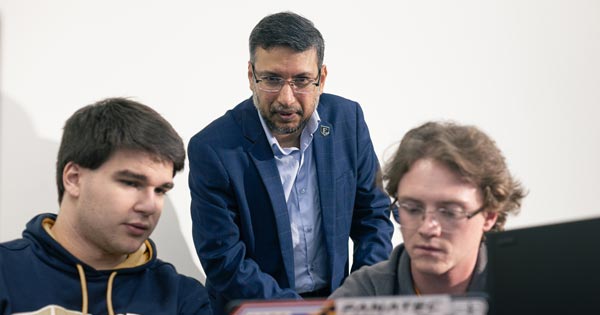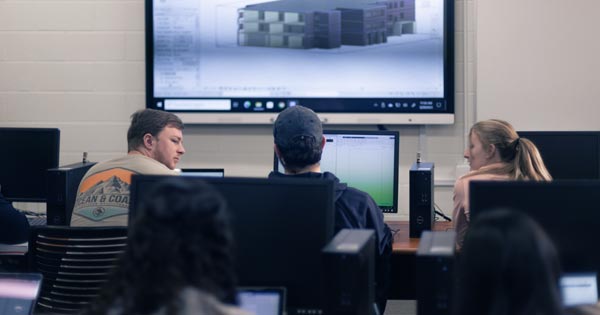M.S. in Technology, Digital Construction and Data Analytics
The construction industry is rapidly adapting various digital tools and techniques. More volume and variety of data are being collected by construction professionals more rapidly than ever before. Examples of various structured and unstructured data collected from construction projects include contracts, bid data, daily work reports, pictures, videos, and point cloud data. These data may be collected using devices such as digital cameras, LiDAR scanners, smartphones, etc., and they may be collected from ground or aerially (e.g., using drones). Although these data are being collected, they are highly underutilized despite their potential use cases. The Digital Construction and Data Analytics concentration focuses on various topics related to the collection and analysis of relevant construction datasets using modern digital tools and various data mining techniques for enable data-driven project management decision makings.
Flexibility
Can be taken part time with flexible scheduling. Mostly after-hours.
Value
Much less expensive than outside training.
Future-Proof
State of the art equipment, latest robots and vision systems.
Common Career Paths
The Engineering Technology graduate program can prepare you for a variety of careers
such as:
- Augmented Reality, Virtual Reality Manager
- Building Information Modeling (BIM) Specialist
- Construction Data Analyst
Entrepreneur- Estimator
- Project Manager
- Scheduler
Why Digital Construction and Data Analytics?

Predictive maintenance: Data analytics can be used to monitor the performance of engineering systems in real-time, and identify any issues or potential failures before they occur. This information can be used to schedule maintenance and repair work proactively, reducing downtime and minimizing the risk of catastrophic failures.
![]()

Process optimization: Data analytics can be used to analyze large volumes of data generated by engineering systems, and identify patterns and trends that can be used to optimize processes and improve efficiency. For example, this could involve using data analytics to identify areas where energy consumption can be reduced or to identify bottlenecks in a manufacturing process.
![]()

Quality control: Data analytics can be used to analyze data from sensors and other monitoring devices to identify quality issues in engineering systems. This information can be used to make adjustments to the design or operation of the system to improve overall quality and reliability.
![]()

Risk management: Data analytics can be used to identify potential risks associated with engineering systems, and develop strategies to mitigate those risks. For example, this could involve analyzing historical data to identify patterns that could indicate an increased risk of failure, or using predictive modeling to identify potential hazards in a manufacturing process.
-
Admission Requirements
Applicants must meet all the requirements for admission to both the Graduate School and:
- Have a Bachelor’s or Master’s degree in one of the following areas: Engineering, Engineering Technology, Mathematics, Physics or other technical-related area.
- Have a minimum cumulative GPA of 3.0 (on a scale of 4.0) for all attempted course work for the Bachelor’s and/or Master’s degree described in item 2 above.
- Submit a personal statement of 1-2 pages (double spaced, minimum 1-inch (2.54 cm) margins, minimum 12-point font) describing your industrial work experience and/or academic course work, and why you seek entry into the program. This statement will be reviewed by the faculty to support admission decisions to the program.
Preference will be given to students who have graduated from an Accreditation Board for Engineering and Technology (ABET), accredited engineering/engineering technology program or international equivalent; or have relevant industrial experience in the degree areas of study.
-
Program of Study
Engineering Technology, M.S. Degree Requirements: 40-42 credits
Core Requirements: 12 credits
Concentration: 18 credits
Engineering Technology Symposium: 4 credits
Capstone (choose one): 6-8 credits
Thesis: (6 credits)
Non-thesis Option 1: Internship (6 credits)
Non-thesis Option 2: Advisor Approved Electives (6-8 credits)
TOTAL: 40-42 credits
Engineering Technology Core Requirements: 12 credits
CSCI 5730 - Enterprise Information Systems (3 credits)
ENTC 5065 - Solid Modeling and Prototyping (3 credits)
ENTC 5630 - Project Management (3 credits)
ENTC 5950 - Methods of Research (3 credits)Digital Construction and Data Analytics Concentration Requirements: 18 credits
CSCI 5000 – Data Management (3 credits)
ENTC 5100 – Digital Construction and Project Delivery (3 credits)
ENTC 5317 – Building Information Modeling (3 credits)
ENTC 5417 – Construction Financing and Administration (3 credits)
ENTC 5605 – Construction Data Analytics (3 credits)
SURV 5617 – Digital Mapping (3 credits)Engineering Technology Symposium: 4 credits
ENTC 5000 - Engineering Technology Symposium (1 credit) (Take 4 times for a total of 4 credits)Capstone
Choose one option from the following:Thesis Option: 6 credits
ENTC 5960 - Thesis (3 credits) (Take for a total of 6 credits)Non-thesis Option 1: 6 credits
ENTC 5999 - Internship/Cooperative Education (1-3 credits) (Take for a total of 6 credits)Non-thesis Option 2: 6-8 credits
Choose two courses from the list below:
SCI 5010 – Programming for Data Analytics (3 credits)
CSCI 5050 – Decision Support Systems (3 credits)
GEOS 5010 – Geospatial Analysis (3 credits)
GEOS 5350 – Statistics for Geosciences (3 credits)
ENTC 5957 – Topics in Technology (1-6 credits)International Students: Seminar Policy
International Students: Must complete 4 credits of International Student Seminar as part of their graduate program.
Graduate & Tuition Scholarship
The department offers a limited number of graduate and tuition scholarships to highly qualified graduate students. If you have been accepted in the program and are interested for a GA/TS, please complete the following tasks:
- Fill out this form, attach latest CV/resume and send it to the department chair, Dr. Keith Johnson (johnsonk@etsu.edu)
- Enroll in classes
Students will be considered throughout the application process for GA/TS positions. Final decisions will be made before the start of classes.
Keith V. Johnson, Ph.D., Professor and Chair
East Tennessee State University
Department of Engineering, Engineering Technology, Interior Architecture, and Surveying
Box 70552
Johnson City, TN 37614
(office) 423-439-7813
(fax) 423-439-7830
johnsonk@etsu.edu
Contact Us

Dr. Moin Uddin
Professor/Director of TTU-ETSU Joint Engineering Program; Graduate Program CoordinatorEngineering, Engineering Technology, Interior Architecture, and Surveying
- uddinm@etsu.edu
- 423-439-4164
- 203E Wilson-Wallis Hall

Dr. Joseph Shrestha
Associate ProfessorEngineering, Engineering Technology, Interior Architecture, and Surveying
- shresthak@etsu.edu
- 423-439-7821
- 104B Wilson-Wallis Hall
 South Dossett Drive - Closure...
South Dossett Drive - Closure...